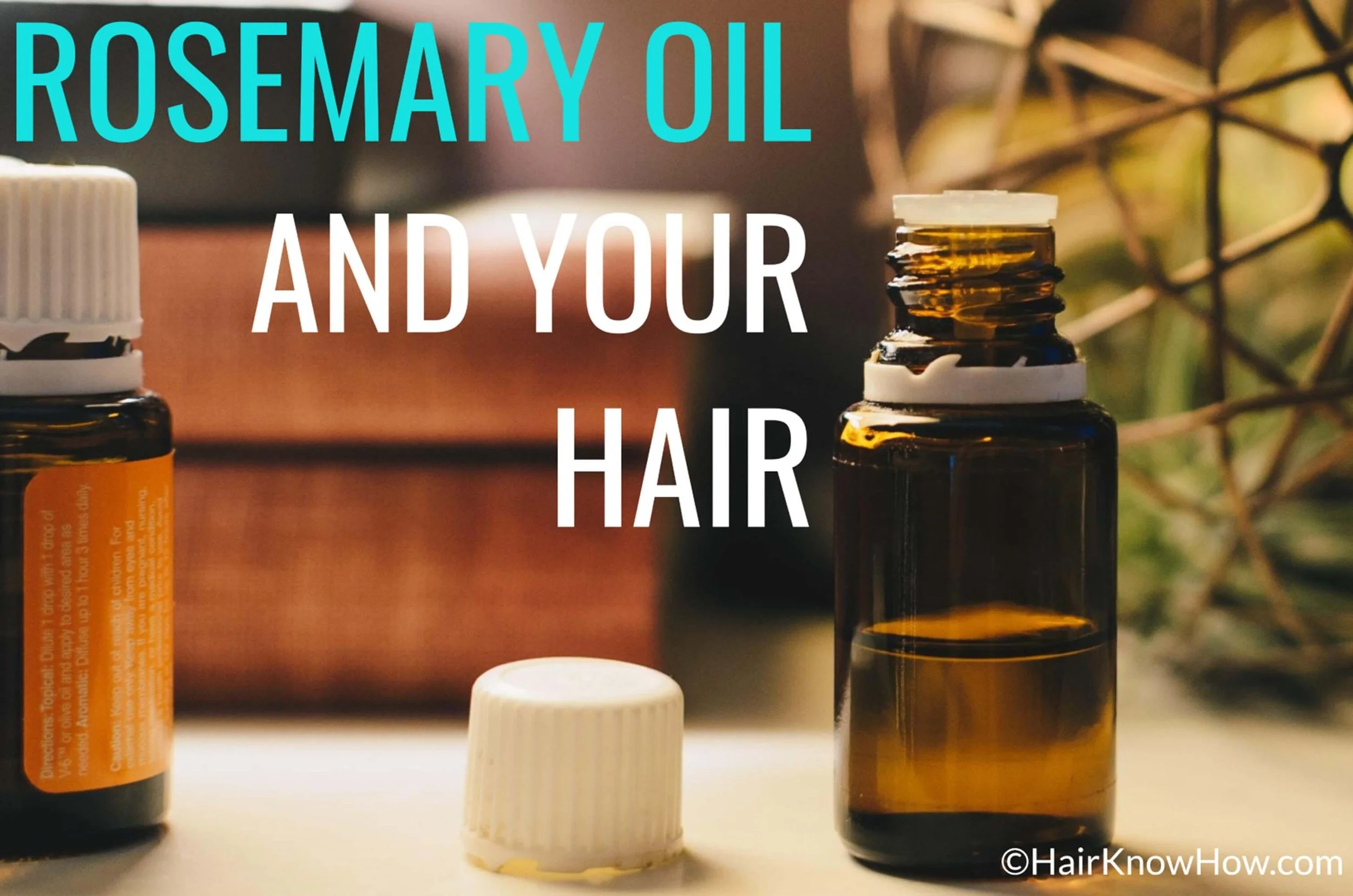Rosemary Oil For Hair
Are you tired of dealing with dull, lifeless hair? Perhaps you experience thinning hair, dandruff, or itchy scalp? The solution is rosemary oil! This essential oil is renowned for increasing blood flow, promoting hair growth, and giving your locks shine.
In this article, we'll examine the numerous advantages of using rosemary oil on hair and offer advice on how to work it into your regular hair care regimen. Say goodbye to bad hair days and hello to healthy, luscious tresses with the power of rosemary oil!
As an Amazon Associate I earn from qualifying purchases - Click here to read our Affiliate Disclaimer
What Is Rosemary Oil?
The leaves of the rosemary plant, which is indigenous to the Mediterranean region, are used to make rosemary oil. The plant is now grown all over the world, including in the US and the UK, where it is frequently used as a cooking herb.
For centuries, rosemary oil has been a component of hair care products. Its primary advantages include promoting hair growth, preventing dandruff, and enhancing shine. Additionally, rosemary oil prevents split ends and strengthens the hair shaft.
According to a chemical analysis of rosemary oil, 1, 8-cineole, borneol, bornyl acetate, camphor, alpha-pinene, and beta-pinene are some of the natural chemicals that are typically present in it.
The ratios of these chemical components are dependent on an array of variables, including the plant strain, the environment in which it is grown, the soil, the age of the plant, the presence of pests, etc.
Where Does Rosemary Oil Come From?
Rosmarinus officinalis L., the rosemary plant, produces rosemary oil from its leaves. For centuries, rosemary oil has been used to care for hair. The herb rosemary, a member of the mint family, is the source of the oil. Rosemary has white or blue flowers and thrives in temperate climates. The flavour and aroma of the herb are strong and pungent.
The Rosemary plant typically contains 0.5 to 2.5% v/w of essential oil. The process of steam distillation, which involves heating plant material to release its essential oils, is used to extract the oil. Rosemary oil is a light yellow liquid with a potent herbaceous aroma. Due to the fact that it promotes hair growth and prevents hair loss, it is frequently used in hair care products.
What Are The Properties Of Rosemary Oil?
Rosemary oil has many properties that make it beneficial for hair. As a natural antiseptic, rosemary oil can aid in clearing the hair and scalp of bacteria and other impurities. Rosemary oil is also a natural astringent, which can help tone and tighten the scalp and hair follicles. Additionally, as a natural stimulant, rosemary oil can aid in promoting hair growth.
Numerous healthy substances, such as antioxidants, anti-inflammatory agents, and antimicrobial properties, can be found in rosemary oil. Due to these qualities, it can be used to treat a number of hair and scalp issues.
How Does Rosemary Oil Benefit Hair?
For a very long time, other scalp issues and hair loss have been naturally treated with rosemary oil. The oil can to stimulate hair growth, prevent baldness, and improve circulation to the scalp. Additionally, dandruff and dry scalp are both treated with rosemary oil.
Stimulates Hair Growth
Rosemary oil is excellent for both promoting hair growth and halting hair loss. This makes it the perfect option for people who have alopecia or other types of hair loss looking for a natural alternative treatment. Rosemary oil stimulates and improves circulation on the scalp, which promotes hair growth. Additionally, it aids in clearing the scalp of buildup that may clog pores and contribute to hair loss.
Growth stimulation is one of rosemary oil's most well-known advantages for hair. This is due to the fact that rosemary oil has been demonstrated to improve blood flow to the scalp, which may aid in the growth of new hair follicles.
Prevents Hair Loss
If you want to stop hair loss, rosemary oil is a great option. This oil has a reputation for promoting hair growth and reducing hair loss. Additionally, it has antioxidant qualities that may aid in preventing harm to the hair follicles and scalp.
Numerous clinical studies compared the use of rosemary oil for six months to the application of 2% minoxidil. This study discovered that using rosemary oil regularly decreased the incidence of androgenic alopecia (AGA). In this study, a six-month regimen of rosemary oil treatment for hair loss was at least as effective as 2% Minoxidil while having many fewer side effects (ref).
The key to any hair loss treatment, whether it be minoxidil, caffeine, or rosemary oil, is to apply the active ingredient consistently each day. The majority of scientific studies indicate improvement after six months (not three) of regular use.
Helps To Treat Dandruff
Dandruff is an embarrassing and uncomfortable condition that causes the skin on your scalp to flake off. Numerous underlying conditions, such as dry skin, oily skin, an overgrowth of yeast, or a medication reaction, can result in dandruff. Dandruff can be treated with rosemary oil.
Fortunately, rosemary oil's anti-inflammatory, antimicrobial, and moisturising qualities make it effective in treating dandruff. This helps to lessen skin flaking and controls the development of yeast on the scalp.
Use of rosemary oil for a prolonged period of time (six months or more) can aggravate the scalp and worsen dandruff. Therefore, only use rosemary oil as a temporary fix or take regular breaks from using it. For example, use rosemary oil for three weeks and then take a one-week break. Using another natural oil instead of rosemary oil, such as peppermint or pumpkin seed oil, may give the same advantages without long-term scalp irritation issues.
Improves Scalp Health
The ability of rosemary oil to enhance the health of the scalp is well known. In addition to preventing dandruff and other scalp issues, it can aid in promoting hair growth. Additionally, rosemary oil is thought to help dry, damaged hair. Regular use of rosemary oil can aid in damage repair and improve the appearance and health of your hair.
How To Use Rosemary Oil For Hair
Rosemary oil is a popular choice for hair care because it can help to stimulate hair growth, reduce hair loss, and improve scalp circulation.
You can either massage rosemary oil into your scalp or mix a few drops of it with your shampoo or conditioner to use it on your hair.
Leave the oil in your hair for at least 30 minutes before rinsing it. You can mix rosemary oil with a carrier oil, such as jojoba, coconut, or olive oil, and then apply the mixture to your scalp and hair. Most people can usually get by with a diluted solution of 2-5% rosemary oil. Rosemary oil can moisten your scalp and lessen flakes if you have a dry scalp or dandruff.
If you want to give rosemary oil a try on your hair, make sure to buy it from a dependable supplier of high-quality goods. Choose a steam-distilled or cold-pressed organic product, and make sure it doesn't have any additives or fillers by reading the label.
Rosemary Oil For Hair Growth
Rosemary oil is one of the best oils for enhancing hair growth naturally. Additionally, it can help with dry scalp, hair loss, and dandruff.
Rosemary oil can be applied in a variety of ways to promote hair growth. One method is to incorporate a few drops of the oil into your conditioner or shampoo. Before shampooing, you can also massage the oil into your scalp. Another choice is to apply rosemary oil to your scalp and hair while combining it with another carrier oil, like jojoba or coconut oil. Before washing it off, let it sit for at least 30 minutes. You can do this once or twice a week.
Rosemary Oil For Hair Loss
Over the course of six months of consistent use, rosemary oil can effectively treat hair loss and is compatible with 2% minoxidil. By promoting hair growth, it can stop further hair loss. Rosemary oil is also beneficial in treating dandruff and scalp infections.
Massage the scalp with a mixture of a few drops and a carrier oil.
Allow to sit for at least 30 minutes before shampooing.
For best results, repeat this procedure several times each week.
Rosemary Oil For Dandruff
Dandruff can be treated naturally with rosemary oil. It has antifungal and antibacterial qualities that can aid in preventing fungus and bacteria from growing on the scalp. The production of sebum can be regulated by rosemary oil, which can lessen the occurrence of dandruff.
To use rosemary oil for dandruff:
Several drops should be added to a carrier oil like jojoba or coconut oil.
Before washing it off, massage the mixture into your scalp and let it sit there for at least 30 minutes.
Repeat this procedure two or three times weekly until your dandruff is gone.
Alternatively, try specialised dandruff-controlling shampoos; these are highly effective and work quickly.
Rosemary Oil For Scalp Health
A natural short-term solution for a dry, itchy scalp is rosemary oil. However, some studies have indicated that prolonged use (use that lasts longer than six months) may cause itching to worsen. Additionally, it can aid in promoting hair growth and halting hair loss. Rosemary oil is a good choice for people who are looking for a natural alternative to conventional treatments for scalp conditions or want to use a combination of natural hair oils.
Apply a few drops of rosemary oil to your scalp after combining it with a carrier oil like jojoba or coconut oil.
Gently massage your scalp after applying the mixture.
Let it sit for at least 30 minutes before shampooing it off. Once or twice a week is sufficient for this treatment.
Precautions And Side Effects Of Rosemary Oil
Rosemary oil is generally considered safe for most people. Before using it, there are a few safety precautions to be aware of. Following topical application of rosemary oil, some people may experience skin irritation.
Before applying the oil to the scalp, make sure to dilute it with a carrier oil because undiluted essential oils can irritate the skin. If irritation develops, stop using the product and wash the affected area with soap and water. Before using any new product, including rosemary oil, people with sensitive skin or allergies should always conduct a patch test on a small area of their skin.
If you have delicate skin or an allergy to rosemary, stay away from using this oil.
If you take any medications, it's important to check with your doctor or chemist before using rosemary oil because some medications may interact with it.
Before using rosemary oil or any other natural remedy, speak with a medical professional if you have severe hair loss or other serious hair or scalp issues.
Precautions
There are a few things to keep in mind when using rosemary oil on your hair:
Before using the oil on your scalp or hair, make sure it has been diluted. This can be accomplished by combining a few drops of rosemary oil with a carrier oil like jojoba or coconut oil.
At first, only use a little rosemary oil. You can use less oil or stop using it altogether if you have a sensitivity to it.
Avoid using rosemary oil if you are pregnant or breastfeeding.
Side Effects
Users of rosemary oil need to be aware of a few possible side effects. These include nausea, heightened sun sensitivity, and skin irritation.
The most frequent side effect of rosemary oil is skin irritation. This might show up as an itchy, red, or rashy skin condition. Consult your doctor as soon as you notice these symptoms and stop using the product.
Another undesirable effect of rosemary oil is increased sensitivity to the sun. This implies that you might burn more easily after being exposed to sunlight or UV light. If you intend to spend time in the sun after using rosemary oil, be sure to apply plenty of sunscreen.
Although it is a less frequent adverse effect of rosemary oil, nausea can happen to some people. If you feel sick after using rosemary oil, stop using it right away and see a doctor.
Conclusion - Should you or should you not use rosemary oil?
Rosemary oil is an excellent all-natural solution for hair care use. It has many advantages, including preventing dandruff, encouraging hair growth, and even enhancing the lustre of your hair. For anyone looking to improve the health of their hair, rosemary oil is a great option due to its pleasant aroma and variety of uses. Consider adding rosemary essential oils to your regular haircare routine, whether you have thinning hair or simply want to pamper your scalp more.
Hair loss, dandruff, and poor scalp health are just a few of the issues that rosemary oil can treat naturally and successfully. You can encourage healthy hair growth, minimise hair loss, and benefit from a healthier, happier scalp by incorporating rosemary oil into your daily hair care regimen. Why not try it out for yourself to see the results?
Get Expert Hair Analysis and Help
If you want to discover how well you are looking after your hair, hair type, or porosity, check out one of HairKnowHow's hair analyses below.
Contact the HairKnowHow Team if you have any questions or would like us to include additional information about a particular hair growth oil you are interested in.
Dr Palmer and The HairKnowHow Team.






